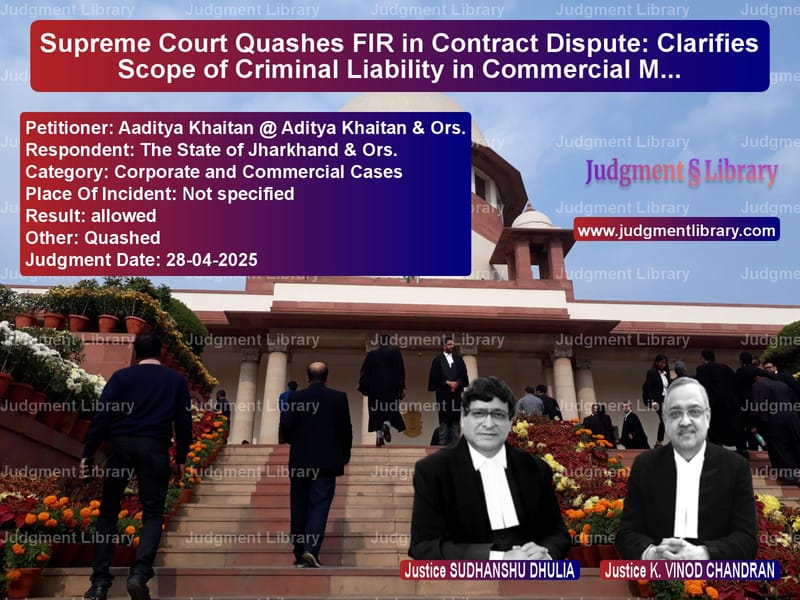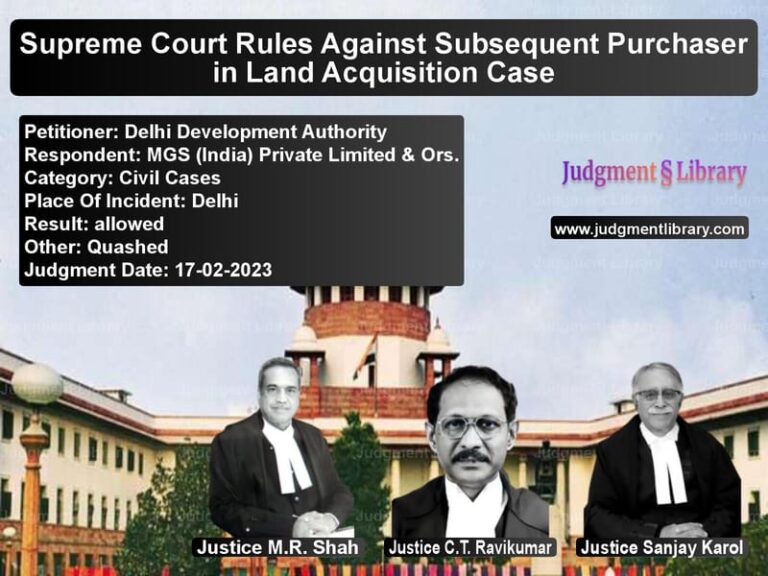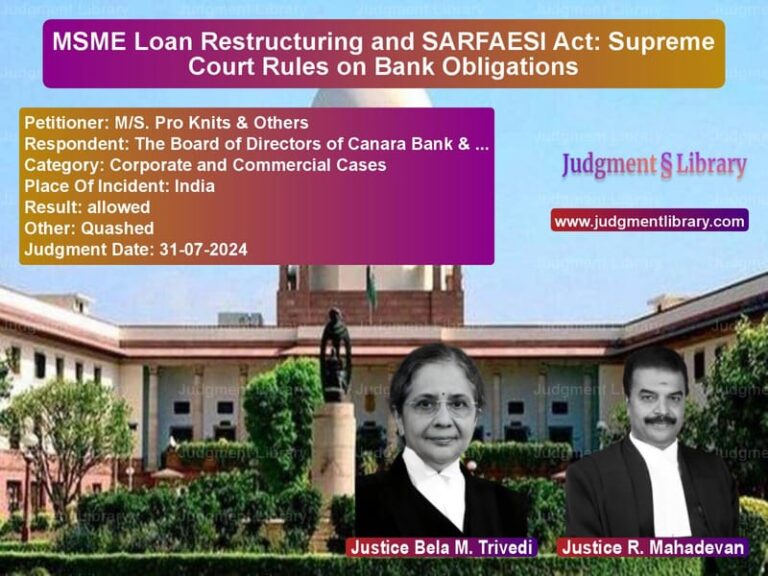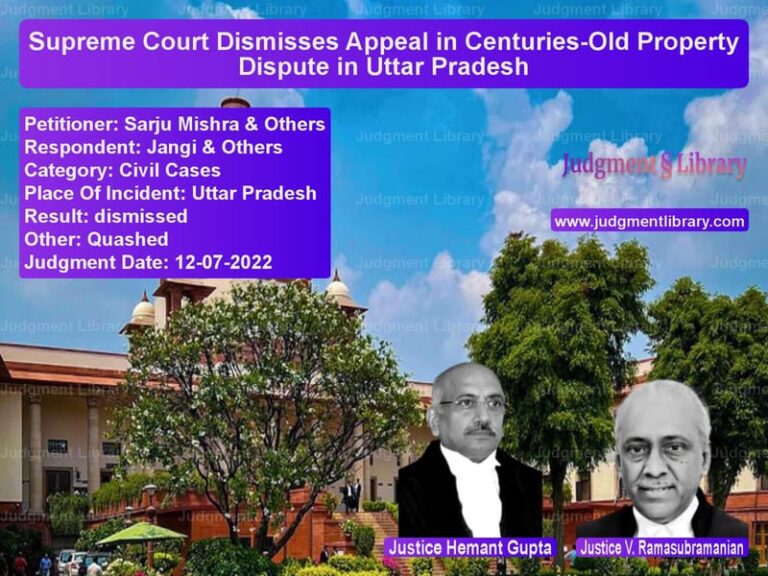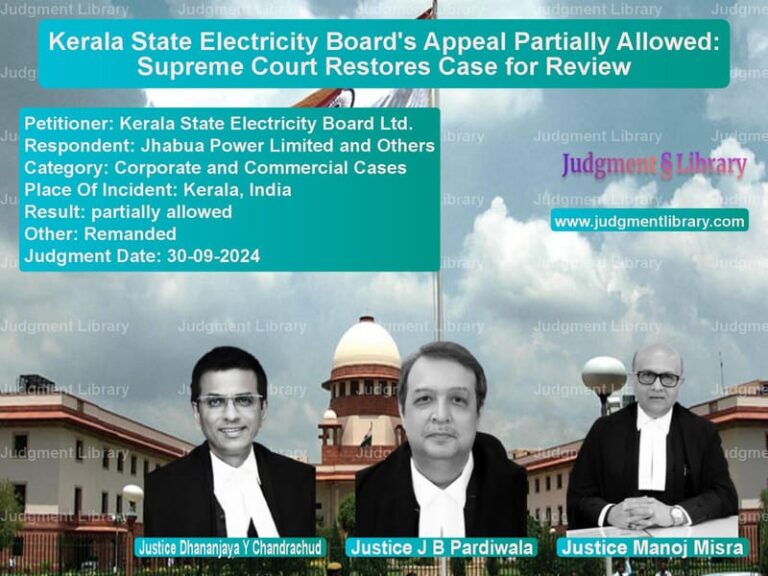Supreme Court Quashes FIR in Contract Dispute: Clarifies Scope of Criminal Liability in Commercial Matters
In a significant judgment delivered on April 28, 2025, the Supreme Court of India quashed an FIR registered against Aaditya Khaitan and others in a contractual dispute case, clarifying the distinction between civil wrongs and criminal offenses in commercial transactions. The case, Aaditya Khaitan @ Aditya Khaitan & Ors. vs. The State of Jharkhand & Ors., involved allegations of cheating and criminal breach of trust arising from a construction contract gone sour. The Court’s decision provides important guidance on when contractual disputes can be criminalized and the proper scope of Section 482 of the Criminal Procedure Code (CrPC).
The Facts of the Case
The dispute originated from a construction contract between National Building Construction Corporation Limited (NBCCL) and McNally Bharat Engineering Company Limited (the first accused company). McNally had sublet part of the work to the complainant company without NBCCL’s consent, contrary to the main contract terms. When payments became due, the complainant alleged that McNally and its officers (the appellants) had suppressed this restrictive covenant and thereby committed offenses under Sections 406 (criminal breach of trust), 420 (cheating), 467 (forgery of valuable security), 468 (forgery for purpose of cheating), and 471 (using as genuine a forged document) of the Indian Penal Code.
The High Court had refused to quash the FIR under Section 482 CrPC, finding that a prima facie case existed against the appellants. However, it had quashed proceedings against NBCCL’s Deputy General Manager. The Supreme Court was called upon to examine whether the High Court properly exercised its discretion under Section 482 CrPC.
Supreme Court’s Analysis
The Court, comprising Justices Sudhanshu Dhulia and K. Vinod Chandran, carefully examined the FIR’s allegations and the contractual relationship between the parties. The judgment makes several important observations:
1. Nature of the Dispute: The Court noted that the core dispute was about non-payment for work done under a contract. “A reading of the complaint would indicate a contract having been entered into pursuant to which there were financial transactions and allegedly amounts are due to the complainant,” the Court observed.
2. Suppression Allegations: Regarding the allegation that McNally suppressed the restrictive covenant about subletting, the Court noted: “While the complainant alleges suppression, obviously, the complainant also did not make any effort to look into the contract entered with the NBCCL by the first accused.”
3. Proper Remedies: The Court emphasized that the complainant had civil remedies available, including arbitration (though currently stayed due to insolvency proceedings). “The complainant would have to take proper recourse and avail its legal remedies for recovery of money, which is the crux and essence of the allegations,” the judgment states.
4. Section 482 CrPC Principles: The Court reiterated the well-established principles for quashing FIRs under Section 482 CrPC, citing precedents like Prof. R.K.Vijayasarathy v. Sudha Seetharam and Indian Oil Corporation v. NEPC (India) Ltd.: “What is required is the examination of the complaint as a whole, without examining the merits of the allegations; desisting from a detailed inquiry or meticulous analysis of the material nor an assessment of the reliability or genuineness of the allegations in the complaint.”
Key Legal Principles Established
The judgment clarifies several important legal principles:
1. Civil vs. Criminal Nature: The Court drew a clear line between contractual breaches (which are civil matters) and criminal offenses. Mere non-payment or contractual disputes, without clear evidence of criminal intent, cannot be converted into criminal cases.
2. Section 482 CrPC Application: The judgment provides guidance on when courts should exercise their inherent powers to quash proceedings, particularly in commercial disputes where civil remedies are available.
3. Corporate Criminal Liability: The decision clarifies when corporate officers can be personally liable for contractual disputes, setting a high bar for converting commercial disputes into criminal cases against individuals.
Conclusion
The Supreme Court allowed the appeal and quashed the FIR, holding that “the allegations do not constitute any offence or make out any case against the accused persons.” The Court found that the High Court had erred in not invoking its powers under Section 482 CrPC in this case.
This judgment serves as an important reminder of the need to maintain the distinction between civil and criminal liabilities in commercial matters. It prevents the misuse of criminal proceedings as a pressure tactic in contractual disputes and ensures that criminal law is not invoked for what are essentially breach of contract cases. The decision will have significant implications for how commercial disputes are litigated in India, particularly in cases where parties attempt to criminalize what are essentially contractual disagreements.
Petitioner Name: Aaditya Khaitan @ Aditya Khaitan & Ors..Respondent Name: The State of Jharkhand & Ors..Judgment By: Justice SUDHANSHU DHULIA, Justice K. VINOD CHANDRAN.Place Of Incident: Not specified.Judgment Date: 28-04-2025.Result: allowed.
Don’t miss out on the full details! Download the complete judgment in PDF format below and gain valuable insights instantly!
Download Judgment: aaditya-khaitan-@-ad-vs-the-state-of-jharkha-supreme-court-of-india-judgment-dated-28-04-2025.pdf
Directly Download Judgment: Directly download this Judgment
See all petitions in Contract Disputes
See all petitions in Judgment by Sudhanshu Dhulia
See all petitions in Judgment by K. Vinod Chandran
See all petitions in allowed
See all petitions in Quashed
See all petitions in supreme court of India judgments April 2025
See all petitions in 2025 judgments
See all posts in Corporate and Commercial Cases Category
See all allowed petitions in Corporate and Commercial Cases Category
See all Dismissed petitions in Corporate and Commercial Cases Category
See all partially allowed petitions in Corporate and Commercial Cases Category

